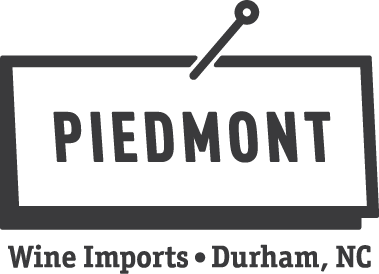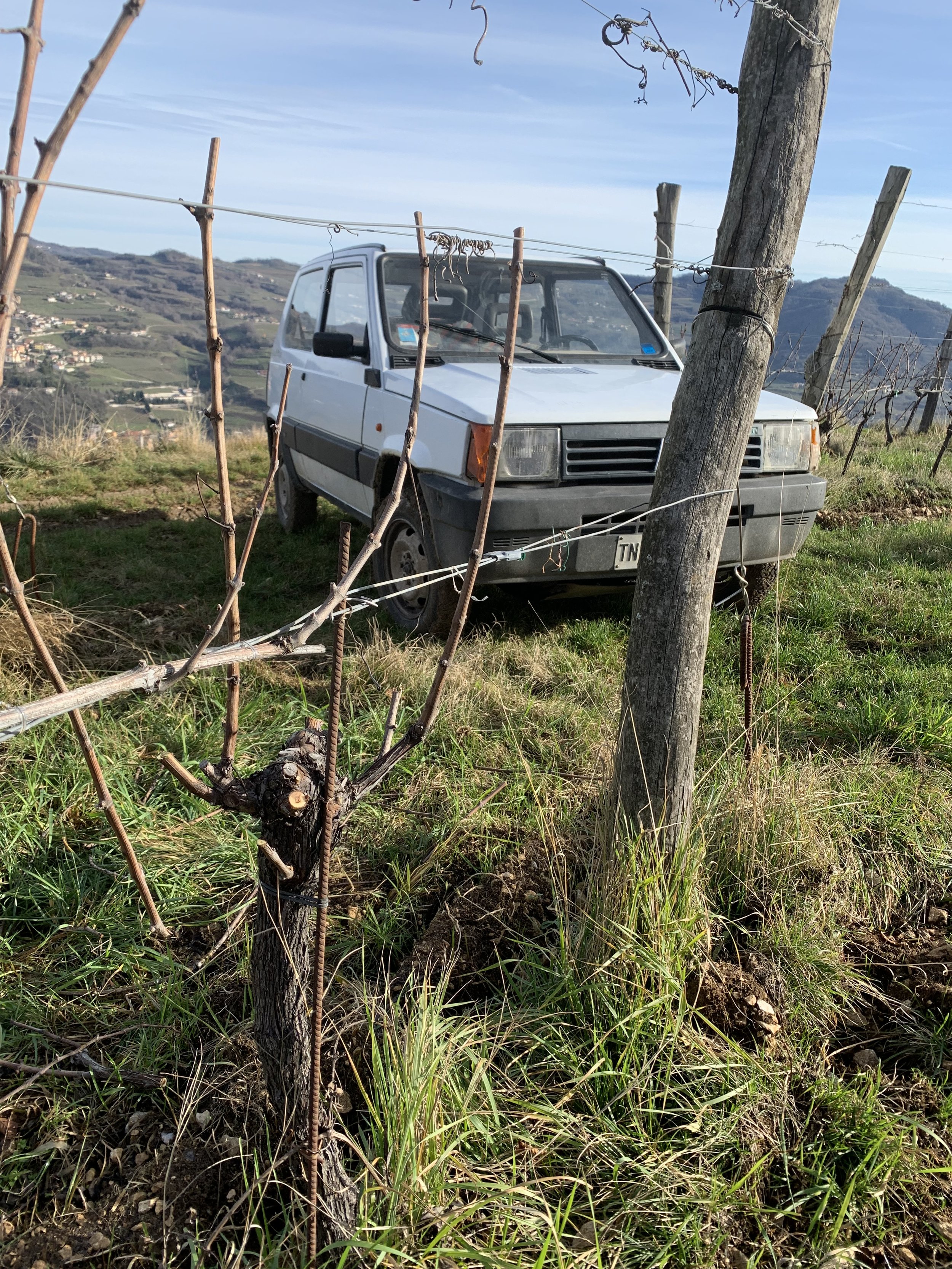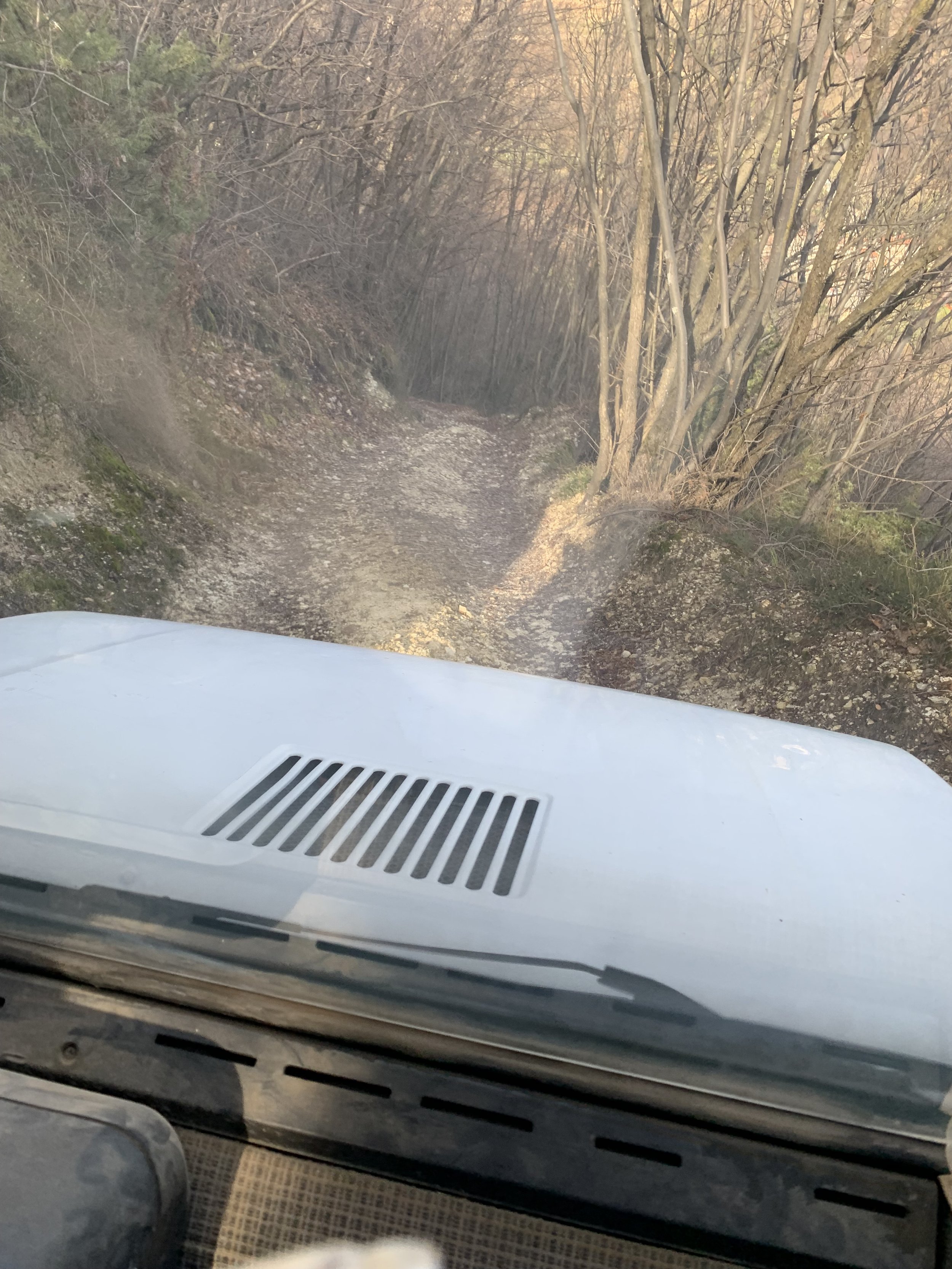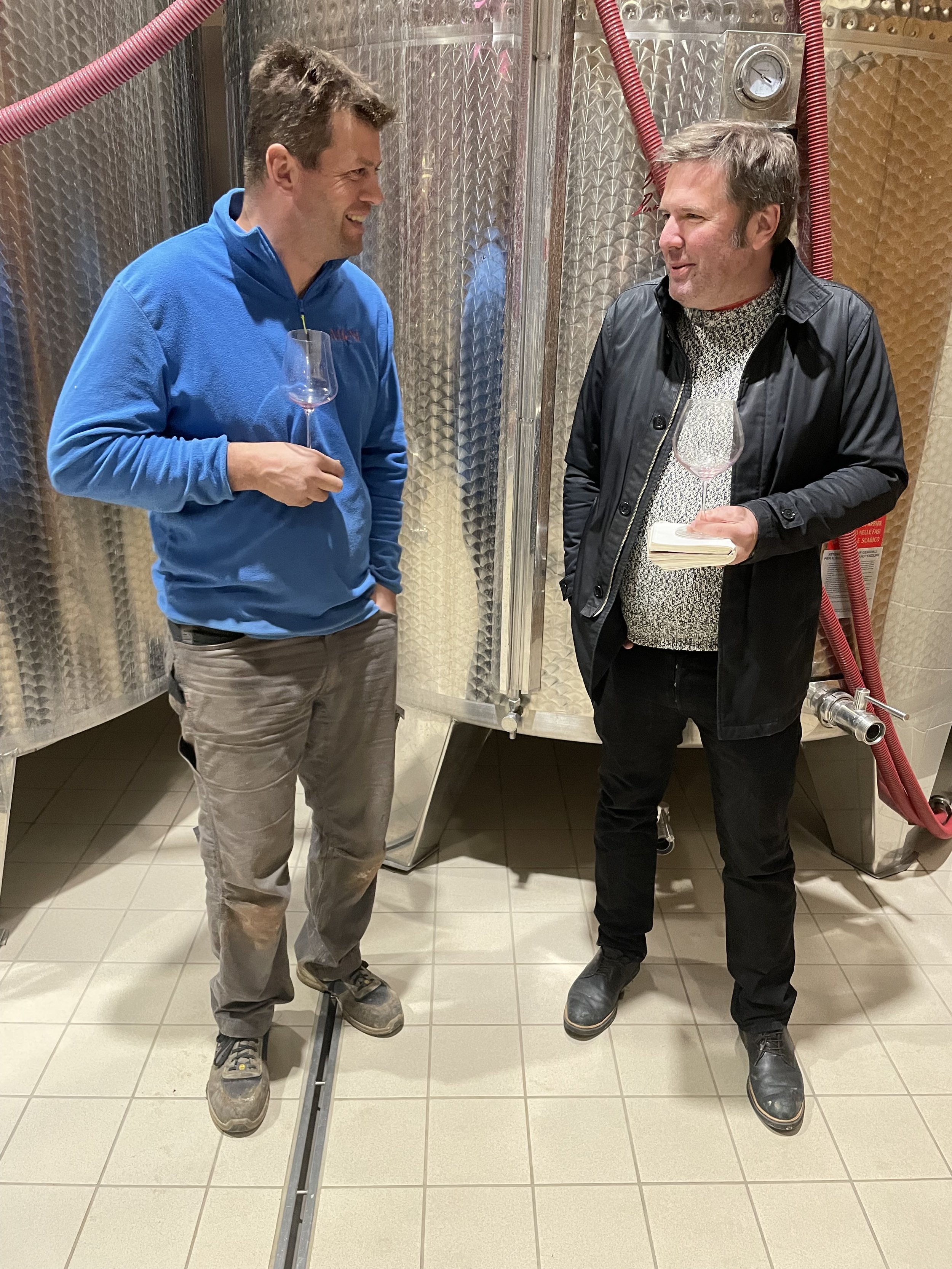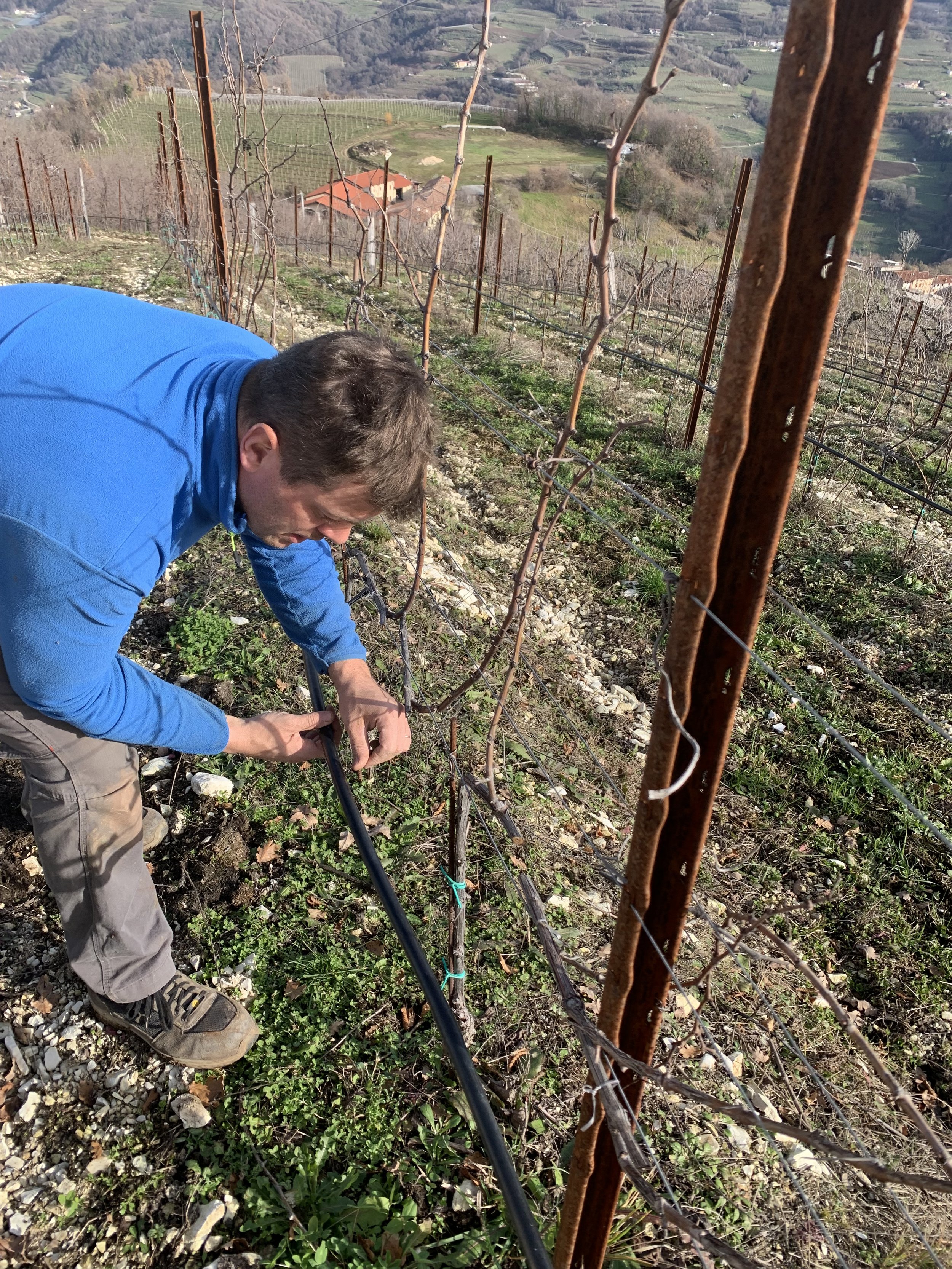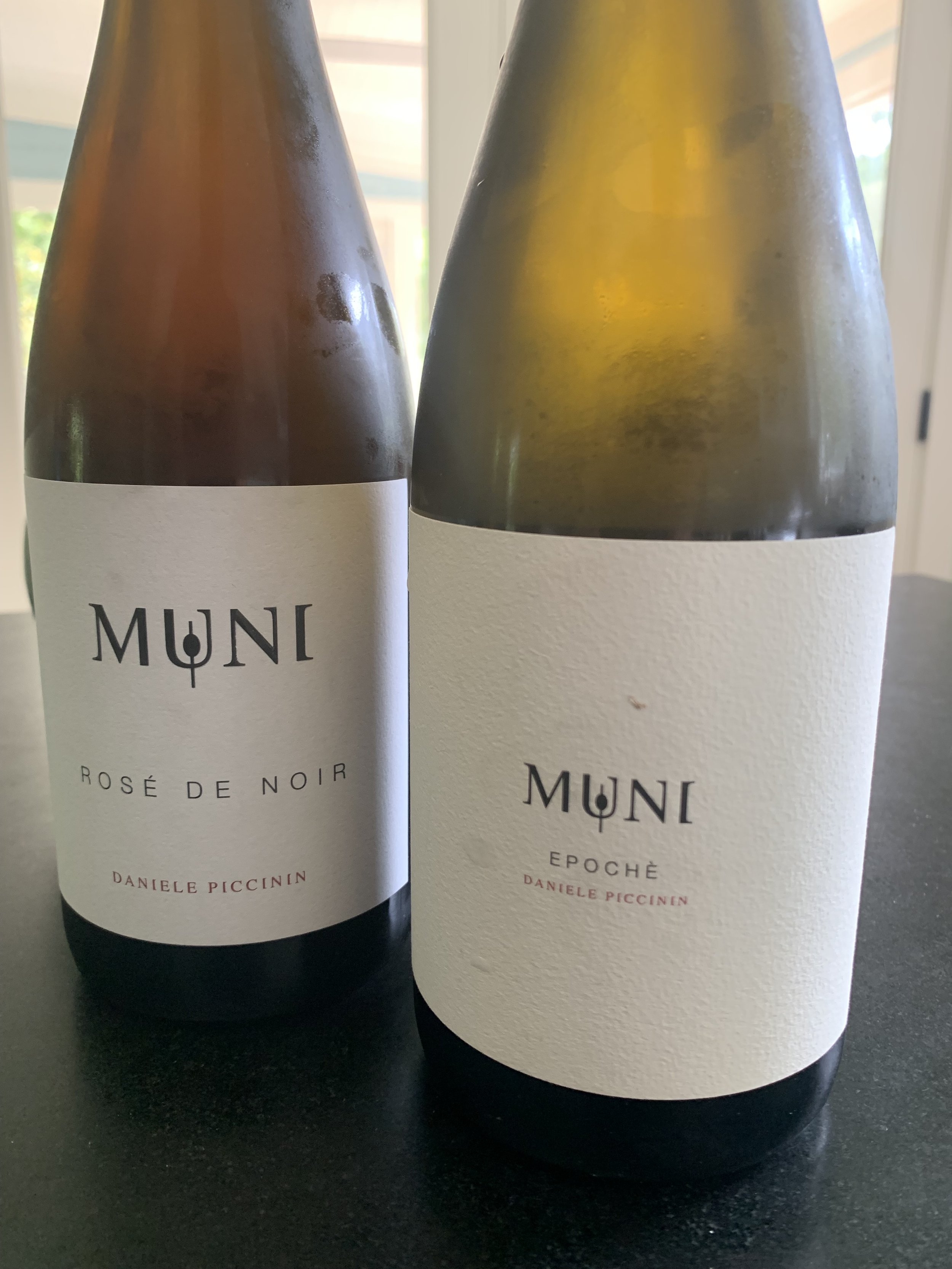Daniele Piccinin: ancient Pandas, heroic farming, and a meal or two.
January, 2023.
I met Daniele Piccinin in his driveway, in front of an apartment building. Snow had fallen, and melted. I don’t think my anonymous rental car could have traversed the rutted dirt-and-gravel paths to his vineyards and cellar. On the main road through San Giovanni Illarione the wide sky is framed by low mountains. Daniele spends his days above the town. Muni, his ancestral farm, is perched on a steep hillside. Vines thrive in its rocky, cool fields. The valley below Piccinin’s farm extends south to Soave, and west to Verona.
Getting into a 40-year-old Fiat Panda 4x4 is step one. And it’s a challenge for me. I’m 6’2”, and not a gymnast. But Daniele is at least 6’5”. He folds easily into the matchbook-sized vehicle. These seemingly indestructible Pandas-from-the-past are the preferred farm vehicle across multiple hilly wine growing regions of Italy. They are light. They don’t get stuck. They fit through claustrophobic, vertigo-inducing passageways. They’ll handle even the most feeble of Italian roads. Daniele can probably pick the thing up with his bare hands. The man is built for farm work in challenging terrain. It’s like the Alps are in his DNA. He once picked up our photographer by his backpack, with one hand, and moved him out of the way of an onrushing vehicle. It takes a lot of pasta to build that strength.
“Don’t bother with the seatbelt!” Daniele laughs. A missed turn here will be fatal, with or without restraint. The car ride is terrifying. They tend to be. There are giant stones everywhere. Daniele has careened around these hairpin turns for years. Each vertical drop is a small heart attack. Several stretches of “road” are so steep that I can’t see the earth in front of the vehicle. Corners are so sharp they require Piccinin to make a three-point turn, with centimeters of stable ground separating our rusted white Panda from the abyss. There’s mud. It’s winter. We’re putting a lot of trust in tiny tires.
There are a few farms scattered around Italy where I really learn about agriculture. Daniele patiently explains everything. He shows me why he leaves every other row uncut (to give the insects a summer home.) He details why he plants French Pinot Noir vinestock instead of Italian Pinot Nero. There are 12 clones of the former (easily available to him) and only three of the latter (overly vigorous: they suck.) Biodiversity is good. This year he’s pruning the canes of his vines shorter. As it stands, he receives a scant one kilogram of grapes between every two plants on the farm. It’s a lot of work to care for nature like Daniele is doing, and the yields are small. But his fruit is excellent. At times perfect.
Against the odds, we survived a multi-vineyard survey of Piccinin’s domain. The Panda tumbled homeward.
As per usual on my infrequent visits, Daniele prepared lunch. Massive portions of pasta, followed by an amazing, very chef-y, deboned-and-rolled-and-stuffed quail entree. When the obligatory (in January) face-sized pieces of panettone came out, I was stuffed. These extravagant holiday breads are not short on calories. I sloshed down a glass of brut rose, to clear a path for dessert.
With lunch we tried the new wines.
The “Larión” Veneto bianco had nice sunny white flower aromas. It’ quite mellow on the palate. A hint of green apple skin gives Larión verve. This wine is a rebranding of the “Muni Veneto bianco” that we’ve always sold. I’m glad to have the new version back in our warehouse.
The “Epoche” metodo classico sparkling wine has a lovely golden color. Mineral, orchard fruit, followed by a nice clean/bright palate-feel. The finish is pure and long. The wine is even better than before. Better than many Champagnes, and obviously cheaper.
The “Rose de Noir” pas dose is also “Champagne-method.” Pale strawberry color. Secondary fermentation in bottle, no dosage, and is frankly quite dry. The finish is chalky. All the upper register of delicate Pinot Noir aromas are here. The wine is rare. Worth an encounter.
We ended lunch talking about Camilla’s olive oil. Geccele is a project that took 12 years to actualise. Started by her father, today the small mill is operated by Daniele, and Camilla’s brother Mattia. This handmade oil is intense. Grassy, fruity, and radically different from central Italian oils. Piccinin generously sent us a half dozen cases. I left happy.
Because he was once a chef in Verona, Daniele’s restaurant recommendations are inspired. He sent me to Al Pompiere, a trattoria whose scrupulously traditional interior would have caused hesitation, were it not for Piccinin’s recommendation. It isn’t too much: old wood paneling, classic green-and-white checked tablecloths, an epic cheese case center stage. It just looks too perfect. Framed celebrities. A dining room full of locals, in finery. The wine list was exceptional. I chose a bottle of Ch. Simone Palette rouge, which was sublime with the best ravioli I’ve had in my entire life. Or am likely to have, for that matter. It takes 10,000 hours to create pasta with the texture that surrounded (somehow) a tender hen filling. For these pastas alone, if everything else was bad (it wasn’t) Al Pompieri would be worth visiting. The gulf between the fresh pasta I can consume in my native land and what discerning Veneto diners enjoy seems to be widening.
The chef at Al Pompieri was friendly. Patient with all my questions about the real food of Verona. The dining room stayed full until after midnight. Preceding the perfect ravioli, I’d eaten a vividly yellow squash soup, garnished with crispy hazelnuts and local mushrooms, scattered like desiccated leaves on a forest floor in winter.
The tremendous volume of baccala served on creamy polenta for my third course is hard to describe. I felt fear. And admiration. It was intense in every way. Sensory overload. Pungent.
Remarkably, I dined again.
Imbottito delle 4 ciacole is a deceptively simple wine bar-ish space in a neighborhood barely outside the centro storico. We dined early (8pm) and it was quiet. A few locals huddled in the front room/bar. We were seated in the restaurant-like back room. Again, the wine selection was geographically wide ranging. In Italian wine hubs, sometimes you can only find local bottles. The food was perfect for soaking up multiple glasses of Corvina - fried risotto balls, polenta fritters topped with baccala, carpaccio, meatballs, grilled radicchio. Did I mention that Veneto fare is hearty? Even moreso in winter. Bring your appetite. And a salad.
Thankfully, it was cold outside. Rain started to fall. I picked my way from awning to awning. Verona was asleep. I needed to leave town too early, to cross the peninsula. Maybe Genoa will have a vegetable. Some hydroponic gem lettuce. A juice bar.
Daniele Piccinin inspires us. His wines are quietly among the best we import. They are beautiful expressions of his homeland. They are made the complicated hard way, with thought, observation, and thousands of hours of toil. When you drink them, Piccinin’s wines create emotion. We feel. We are tasting something real. A lot of food is simulacra. Ultra-Processed, untethered, a feint to distract from the absence of substance. Daniele’s wines remain articulate and alive. Which makes sense. Spend time with Daniele and you feel energy, the joy of living. It’s infectious: I can’t wait to return.
